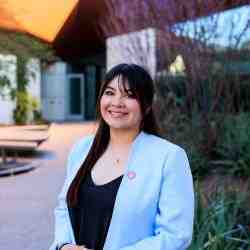Moje téma
Alejandro is bridging the digital divide for Indigenous youth by constructing career pathways grounded in culturally aligned digital skills training. His work harmoniously combines digital skills development with Indigenous knowledge, empowering the next generation of Indigenous technologists. Through close collaboration with tech firms, Alejandro is shaping opportunities for emerging Indigenous technologists to thrive within the tech sector.
Co chci změnit
Alejandro is bridging the gap between technology and Indigenous culture in a way that truly addresses the digital divide for Indigenous youth while fostering positive change in how technologies serve humanity. Through his education technology non-profit, the Indigenous Friends Association (IFA), Alejandro aims to decolonize digital spaces by offering digital skills training and developing software that are culturally aligned with and serves Indigenous people. This work showcases to the broader ecosystem the importance of building reciprocal relationships with Indigenous communities as the mantra “nothing about us without us” asserts.
Alejandro is building digital skills training programs that place equity, and Indigenous ways of knowing and healing at the centre. The INDIGital and IndigiTECH skills training programs are integrating digital competencies like coding, web design, and UX design with land-based teachings, examples of Indigenized tech, community-based values and reciprocity. Some sessions are led by Indigenous Elders and Knowledge Keepers who share stories, delving into topics such as indigeneity and decolonization. Collaborating with Elders and Knowledge Keepers strengthens intergenerational bonds and ultimately shapes Elders’ views (even among those who were initially hesitant) on technologies and their potential use within First Nations, Métis, and Inuit communities in Canada and Indigenous communities in the global context. This approach not only empowers Indigenous youth, but also provides them with pathways for post-secondary education and employment, supporting their autonomy in shaping their future outcomes. As of 2023, IFA’s youth programming has successfully been implemented in many parts of Canada with a focus on English-speaking provinces. The IFA’s approach is about equipping young people with the right marketable skills while building bridges with the tech sector through internships and training. This aims to co-create a new generation of tech workers who can design, develop, and integrate Indigenous traditions and cultures into the digital tech ecosystem.
Grounding this work in the Truth and Reconciliation Commission’s (TRC) call to action #7, Alejandro is challenging the tech sector to develop practices and policies that work side by side with tradition and culture. One of the ways he does this is by building software that places Indigenous experiences at the centre of the design. His iConnectED platform, designed specifically for low connectivity areas, empowers local educators, facilitators, and teachers to easily create and share web-format learning resources through their preferred social media messaging app. Initially designed to serve Indigenous communities in Mexico, Alejandro has introduced this software to Canada and is now actively exploring its global potential and applicability. Similarly, his other apps address social needs within Indigenous populations by offering support to reduce isolation and enhance health outcomes.
Alejandro’s model has emerged as an important solution for companies seeking to bridge the educational and employment gaps between Indigenous and non-Indigenous people in Canada but lack the know-how to do so. By forging partnerships with tech companies and governments, Alejandro is closely collaborating with them to shift behaviours, recruitment practices, and organizational culture to create space for Indigenous talent. Channelled through the IFA’s programs, Indigenous youth not only acquire technical skills, but they do so while remaining close to Indigenous principles and cultures, which support their well-being.
Kde vidím problém
As the world shifted to online learning and remote work during the pandemic, Indigenous youth across Canada embarked on a journey of adaptation (steeper than their non-Indigenous counterparts), by honing their technical skills and figuring out ways to integrate into the unfolding digital era. According to a recent Royal Bank of Canada (RBC) study, a considerable number of Indigenous youth envision themselves as catalysts, working to bridge the gap by fostering digital literacy, economic prospects, and prosperity within their communities. However, for generations, Indigenous youth have encountered many obstacles when it comes to accessing opportunities and have often been pushed to the periphery of economic life. In the tech industry, Indigenous youth lack role models who share their Indigenous identity and occupy the positions they aspire to achieve. Factoring in limited access to high-speed internet and lack of technological resources in their vicinity, Indigenous youth are bound to encounter difficulties in building the qualifications, expertise, and professional connections necessary to enter an increasing digital job market. A First Nations Technology Council (FTC) study found that 76% of Indigenous youth living remotely “saw no opportunities for technology training within their community.”
Representing Canada’s fastest-growing youth population, Indigenous young people under the age of 24 account for almost half of the population of all Indigenous communities in the country. Populations in Indigenous communities are 8.8 years younger on average than the non-Indigenous population in Canada. From coast to coast, Indigenous youth face significant challenges in accessing employment and skills-based training due to deeply ingrained discriminatory policies and practices rooted in the legacy of colonization. The disparities between Indigenous youth and non-Indigenous youth are underscored by data from Statistics Canada, revealing the over-representation of Indigenous youth within the correctional system. Although comprising just 8.8% of the youth population in Canada, Indigenous young people accounted for 43% of youth admissions to correctional services in 2018. When it comes to employment, 2016 data indicated that for Indigenous youth, the employment rate was 23% compared to 15% for non-Indigenous youth. In the information, communications, and technology (ICT) industry, the gap between Indigenous and non-Indigenous youth working in tech has widened in the last five years, according to labour force surveys. For Indigenous youth moving to urban areas to access long-term employment, their moves have consequences in terms of mental health due to isolation and lack of cultural gatherings. Despite the TRC call to action #7, which calls upon “the federal government to develop with Aboriginal groups a joint strategy to eliminate educational and employment gaps between Aboriginal and non-Aboriginal Canadians,” progress continues to be slow.
In the tech sector, Indigenous people face multiple levels of discrimination. Exclusionary practices, low remuneration, and a lack of representation are three common experiences. For example, Indigenous peoples represent only 2.2% of Canada’s digital technology workforce, one of the fastest-growing employers’ segment in the country. The Brookfield Institute’s report Further and Further Away: Canada’s Unrealized Digital Potential reports that Indigenous women with a bachelor’s degree have only a 1% chance of entering the digital tech workforce. The same report outlines that efforts must solve multiple issues to address access to the digital technology sector, as there is a “compounding effect of multiple intersectionalities.” Despite 40% of Canadian tech companies prioritizing DEI, research suggests that having such policies does not always translate into meaningful progress. A report by the FTC in British Columbia found that employers often struggle to hire Indigenous staff respectfully and effectively. While organizations may believe they have adequate equity and inclusion practices, the same report revealed that 42% of Indigenous respondents still face a lack of cultural understanding. Many organizations prioritize DEI but encounter challenges in changing established norms and practices to enhance the overall workplace experience.
Jak to změním
Alejandro is reimagining the development and creation of digital technologies centring Indigenous experiences by working with both Indigenous and non-Indigenous communities. His work started in 2015 with the development of the IndigiFriends app, which serves as a supportive platform for Indigenous youth living in urban areas to access 1) information on Indigenous resources and events, 2) social networks, and 3) Indigenous knowledge and peer support counselling. Built based on the Indigenous knowledge paradigm, each user had a level of responsibility, and in-app Elders and Traditional Knowledge Keepers shared knowledge and information daily to keep everyone engaged and less isolated. Alejandro brings together his knowledge, lived experience and community-oriented practices to build bridges in Canada’s digital technology sector by fostering digital literacy development for Indigenous youth. Launched in 2019, IFA educational programming has been developed to deliver equitable, ongoing, culturally informed support systems for sustainable career pathways and development for those seeking employment in the tech sector. Alejandro’s approach disrupts the notion that Indigenous peoples are of the past and that digital spaces cannot include or integrate Indigenous ways of knowing and traditional principles into technological tools. He does this by 1) equipping Indigenous young people with digital literacy training to bring them closer to education or labour market opportunities, 2) by fostering the development of Indigenous technologies solutions to address community challenges, and 3) by developing new research on the issue to support advocacy efforts.
In the current digital landscape, competencies such as UX design and web development are important to position people for flexible tech jobs that can withstand economic shocks. Participants in the IFA’s educational programs gain foundational knowledge that can be used immediately or serve to explore future employment opportunities. The IFA runs two comprehensive and free tech education programs, INDIGital (4 weeks) and IndigiTECH (30 weeks), which effectively combine in-person and online components to foster skills development and provide Indigenous youth with valuable competencies. In both programs, participants are channeled through tech learning experiences, which integrate healing sessions with Elders and Knowledge Keepers to provide pathways to explore their traditions, cultures, and indigeneity. In the various communities where IFA operates, Elders and Knowledge Keepers play a crucial role as key stakeholders, contributing in multiple ways. They actively participate in 1) shaping the cultural aspects of IFA’s programs to align with their respective traditions, 2) delivering the curriculum, and 3) offering on-demand guidance and cultural support. Engaging Elders and Knowledge Keepers represents a vital pillar of IFA’s approach. Notably, the inception of the IFA’s very first app was guided and encouraged by Elder Blu Waters, a Two-Spirit Métis and Cree Elder, who collaborated closely with Alejandro. This approach is deeply nuanced and firmly rooted in the values of tradition, wisdom, and intergenerational cooperation. Indigenous practices such as learning circles are thoughtfully employed to assess participants' newly developed tech tools and conduct “prototesting”, serving as a means to organize and honour the collective wisdom within the group. This practice aims to shift the conversation from knowledge extraction to conversations about self-determination and digital sovereignty. The IFA’s work is in line with the OCAP principles (ownership, control, access, and possession); principles implemented by many organizations to establish practices for the safeguarding and use First Nations peoples’ data. This work addresses the challenge of building digital tools that work side by side with traditional cultures and teaching. Recognizing that the digital sector is one that is intrinsically extractive from individuals, communities, and the environment, Alejandro is showing that there are alternative models of building technologies. Through the synergy of Traditional knowledge within digital development, IFA’s programming helps Indigenous youth to learn about, access, and take ownership of digital technologies to further their autonomy.
Strengthening digital literacy training empowers community-centred digital development. IFA’s INDIGital offers digital literacy, healing, community, and empowerment for Indigenous youth. Their other cornerstone program is IndigiTECH, which enables systemic change by supporting Indigenous youth entering the tech labour market through the delivery of equitable, ongoing, culturally informed, and decolonial career pathways. Recruited through social media campaigns and in-person community events, participants in the IndigiTECH gain access to internships, mentors, childcare, nutrition, laptops, and other support to ensure that they complete the program. Although the graduation certificates have yet to be provided official micro-credentials, Alejandro is actively looking at how an official micro-credential can be set up with an affiliated university. However, the challenge remains that tech education and Traditional knowledge form “moving curriculums” because technology is ever evolving, and different communities cater their cultural teachings to their respective traditions. Conscious of this, Alejandro is exploring ways to officialize IFA’s certificates to validate their public recognition.
IFA has forged collaborative alliances with technology firms to advance its mission. With IFA, companies are examining strategies to enhance the representation of Indigenous technologists within their workforce. This includes discussions about establishing dedicated internship programs for IFA’s participants and devising training programs for recruitment teams. These collaborations encompass corporate entities like Interac and the Vector Institute for Artificial Intelligence (to name a few). For instance, the Vector Institute for Artificial Intelligence hired IFA interns who then became full-time employees, as part of its effort toward greater inclusivity within the organization. Alejandro and his team were granted permission to support the interview process and continue to provide ongoing career counselling to these new hires. A similar type of support has been provided to other successful internship placements facilitated by IFA. Working with Interac, Canada’s interbank network and payment system, IFA has supported the company’s human resources and DEI teams to deliver education sessions to their employees to deepen their understanding of Indigenous history and the lasting impacts of the residential school system. Both Interac and the Vector Institute recognized the need to foster more meaningful relationships and practices when engaging with Indigenous communities through technology, and it was IFA’s unique positioning that filled this gap. Moreover, Alejandro has played a pivotal role in extending this kind of educational outreach to other tech companies, imparting insights on how to develop career pathways that resonate with Indigenous values.
The integration of IFA’s strategies for tech education and employment can be understood as a new talent pipeline in which Indigenous youth are channeled through carefully designed education programs that respect their traditions and worldviews. As a stepping-stone to post-secondary education or directly to the labour market, IFA is creating a new norm in which many tech companies want to be part of to support Indigenous people. These companies represent a growing rolodex of support for the IndigiTECH and INDIGital programs. For instance, IFA has partnered with “With You With Me”, a global recruitment agency whose mission is to bridge the gap between talent and job opportunities in the technology sector, to provide free role matching tech training, and job placement for young Indigenous technologists who graduate from IFA’s programs. In partnering with Shopify, IFA has been able to donate laptops to program participants to make sure they have the latest technology to minimize technical obstacles in their learning journey. As of 2023, IFA has run programming in nearly all English-speaking provinces with a particular focus on Ontario, Alberta, and British Columbia; thanks to their hybrid learning which also allows people to access their programs remotely. Alejandro and his team were recently awarded over $9 million from the federal government to expand and scale in the next five years and with the aim of training 1,500 Indigenous youth. This will eventually lead to a positive feedback loop and positive social returns for Indigenous communities and the Canadian tech sector.
With regards to the development of Indigenous tech solutions, Alejandro and his team have been working on a few public apps in recent years. For instance, developed, piloted, and refined during the pandemic, Alejandro relaunched iConnectED in 2023, a user-friendly and innovative mobile learning platform housed and owned by IFA that brings learning opportunities to anyone, anywhere. This app was piloted through Alejandro’s previous organization in Mexico, Magtayaní (a non-profit organization that aims to support and promote the well-being and sustainability of Totonac Indigenous communities through the reconstruction of social fabric). The app empowers educators to create, manage, and deliver personalized courses while connecting with other educators. On the other hand, learners can easily access their courses through their preferred messaging platform whether it’s WhatsApp or Facebook Messenger. Now, Alejandro and his team aim for this platform to become a leading eLearning hub, reaching remote educators and communities worldwide. The goal is to provide localized content that respects diverse cultures, languages, and learning styles, and for people to have access to these learning tools whether online or offline. The app has been tested with 1,000 active learners and 65 active educators in both Canada and Mexico). Together with the IndigiFriends app (which has over 2000 downloads), and other apps developed by his team, iConnectED exemplifies Alejandro’s commitment to creating digital technology solutions that enable Indigenous communities to actively participate in, contribute to, take ownership of and benefit from digital spaces.
IFA is fast becoming a key field contributor. In 2021, they received a Youth Opportunity Fund—Systems Innovation Grant to build programming and work to address the systems barriers that Indigenous youth face in accessing the digital technology sector. So far, the collaboration has resulted in the release of the Digital Journeys: A Path Towards Digital Economic Empowerment for Indigenous Youths in Canada report with the Dais, Toronto Metropolitan University’s renowned institute for public policy and leadership. Published in 2023, this study highlights the challenges faced by Indigenous youth in accessing employment in the digital technology sectors and showcases the importance of using integrated and holistic approaches like IFA’s model. The research calls for funding in Indigenous-led programming, additional research, and policy action that addresses Indigenous tech literacy, education, and labour force participation through indigenized training.
Alejandro actively participates in collaborative efforts and international forums dedicated to advancing climate change mitigation and adaptation, particularly within the digital tech sector. His focus centres on elevating Indigenous perspectives and approaches. Furthermore, with the support of the Department of Justice in 2021, IFA developed and submitted an Action Plan on the United Nations Declaration on the Rights of Indigenous Peoples (UNDRIP) Act, Canada’s federal legislation on the adoption of UNDRIP. IFA’s contribution outlines various activities to the be taken that address environmental and climate change challenges, racism and discrimination and the support of Indigenous rights in the digital technology sector. IFA’s overall advocacy strategies aim to amplify Indigenous people’s voices, worldviews, and ways of knowing to promote digital tech equity and sovereignty. Their research efforts cast a light on the problem and presents IFA’s model as a viable system changing alternative to current initiative focusing only on delivering technical knowledge without integrating cultural teachings. Alejandro and his team find themselves at an inflection point as their team size has grown threefold in the last 18 months. They are currently exploring potential global applications of their apps and the education model, other synergistic opportunities within the tech sector, and considering how Indigenous-led technology development can support social and environmental challenges.
Kdo jsem
Born in Mexico City to a family with Indigenous ancestry, Alejandro carries a profound desire to challenging social structures for the betterment of all Indigenous communities. Growing up in a close-knit and deeply religious family, Alejandro witnessed the pivotal role of community in fostering social development. During his computer science undergrad, he became involved in mission work with Indigenous communities. Seeing that the university was more focused on the development of the students engaged in the mission than the development of the communities they were working in, Alejandro petitioned his university to change how they engaged with Indigenous communities. Despite resistance from the university, Alejandro cofounded Magtayani in 2009 as an alternative effort.
Magtayani is a youth-based organization that supports Indigenous-led projects for community development and quickly grew to over 250 student participants. While developing Magtayaní, Alejandro continued to look for jobs in computer science and was rejected from his dream job working on tech for social good. This rejection was pivotal, as it led him to commit full-time to working with Magtayaní. Alejandro incorporated the organization and received funding to scale the work and support the self-determination of Totonac Indigenous people. He remains engaged to this day as the President of the Board. When leading Magtyani, Alejandro sought out participation in a mobility program with Saint Francis Xavier University in Canada, where he explored the connections between Totonac and the Mi’kmaq communities. This work was published as an anthropological study and motivated him to undertake his master’s at York University in Toronto to further explore the intersections between Indigenous studies, computer science and international development.
Seeking connections in Canada, Alejandro volunteered with the Indigenous Student Centre at York University. Under the guidance and support of an Elder, he launched the IndigiFriends app in 2016 while still in graduate school. In 2017, Alejandro went on to establish IFA and secured the organization’s first grant in 2018, all while completing his doctoral degree. Initially focused on the app as a main product, Alejandro soon realized that there were major employment and education gaps that he could address with IFA, leading him to develop his flagship education technology programs.
By 2021, Alejandro had successfully completed his Ph.D., which he leveraged to get funding and support to develop and improve his app. Since then, he has wholeheartedly dedicated himself as the full-time Executive Director of IFA. The success of their model and approach has been showcased at RightsCon, the world’s leading event on human rights in the digital age, and Alejandro was also recognized as a social impact leader in Canada (CBC Community Champion) and in Mexico (Reconocimiento al Compromiso por los Demás CEMEFI in 2020). Embracing the principles of true allyship, he humbly considers himself a guest in Canada, fostering relationships with Indigenous communities across the nation. Alejandro’s model possesses the potential to reshape individual and industry narratives, impacting not only Indigenous and non-Indigenous communities in Canada and Mexico but also holding the promise of global influence in the future.




